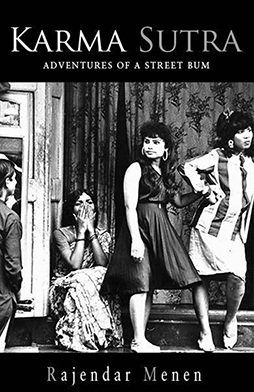DAVID BUTLER
“I have had the privilege of having known Rajendar Menen personally when I was in Bombay. I have known him since his earliest youth and watched him grow from strength to strength. Even though Rajendar is a writer of genius, he is utterly unpretentious, open and honest, and has a unique gift of relating to people regardless of their station in life.
Though he has never stated this in any of his writings, I can bear witness to the fact that on the last day of each month, Rajendar used to walk the streets of Colaba in South Bombay, handing out the cash that remained with him at the month’s end, to the people who could only call the street their home.
“Karma Sutra” is not just about sex workers or procurers or the dispossessed. It also tells the stories of many a fascinating man on the street, like Aijaz Ahmed, the handsome aristocrat, who quietly made it his work to educate homeless children
I am re-reading your book and find it riveting.
Your sweet presence permeated the whole book and while reading Juhu Beach I could vividly visualize you on the beach, with your top shirt button open, giving a glimpse of your beads and amulet.
In Kala Ghoda and Colaba (which brought back memories of the seedy Stifles Hotel behind the Taj, which even housed a German prostitute, and the Radio Club and Arthur Bunder Road which connected it to Colaba Causeway) my heart went out to dear, simple, voluptuous Ganga, who did what she had to do, serviced a less educated class of men with money, and loved her suffering and helpless husband for reasons she could not explain.
The sleek, high priced hookers left me cold.
“Karma Sutra” is deeply moving and written with brutal honesty. It is not a tearjerker and does not ask for mere pity for the outcasts of society, the dwellers of slums and the homeless, and the men and women forced by the circumstances of their birth into the oldest profession in the world. It is, instead, a beacon of light. It gives them a voice and gives them dignity, saying, “We are here, and we exist and we are just as human and worthy of respect and dignity as you are!”
The author is not just an observer and the style is not detached journalistic.
Rather, he is a participant. He makes friends with the people he writes about, and unconsciously, through his friendship (especially because he is not in their shoes), gives them the respect, understanding and acceptance that they deserve.
The book is riveting and a “must read” for all those who love India, and for all those who care about the dispossessed of the world.
Rajendar Menen’s writing stands as a beacon to others who may feel the call to serve their fellowmen with the same unquestioning love and caring as he does.
—– Based in Sydney, David Butler is a bon viveur. He travels the world (often incognito) and helps raise awareness about inequities of all kinds. He loves contact sport, with a special liking for the martial arts, and the vast oceans on which he surfboards whenever he wants to break free. He is also an ardent admirer of Pope Francis and the Dalai Lama.


Leave a Reply